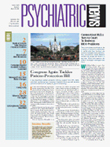The article “Students Learn Psychiatry in Unique Clerkship Settings” in the August 18, 2000, issue provides a valuable look at the diverse experiences psychiatry departments are providing their students through psychiatry clerkships. Since 1994 at the Joan C. Edwards School of Medicine at Marshall University in Huntington, W.Va., we have conducted another worthwhile educational experience on the psychiatry clerkship involving palliative medicine in rural areas.
During their clerkship, students are exposed to end-of-life care issues via a mandatory and intensive eight-week, part-time assignment through a program developed in conjunction with the local hospice. The students are given a thorough didactic orientation to the hospice movement as well as the principles of palliative medicine and are then assigned to one of three hospice staff treatment teams. After observation of the care provided by experienced staff during the first two visits, the students are then expected to make three solo “house calls,” which frequently necessitate the student going to difficult-to-access rural areas, similar to those in which many of them will eventually set up primary care practices. These home visits require students to be completely familiar with all aspects of their patients’ illness, including course, treatment history, and psychosocial impact on the family, as well as the patient. The goal of this hands-on experience is to provide an opportunity for the students to learn a great deal about providing emotional support, pain management, coping skills, and working with others on the treatment team in the Appalachian cultural environment.
At the conclusion of the rotation, each student presents his or her personal experience at an interdisciplinary staff meeting. Didactic work on bioethical issues and other experiences, such as inpatient rounds with a hospice oncologist modeling communication with patients, breaking bad news, and demonstrating adequate pain control, are integrated into the program as well.
Similar to the programs noted in the Psychiatric News article, student support for this clerkship has been overwhelming. In the more than six years of the program’s existence involving 217 students, all but one student of the 208 responding to our questionnaire have said that they had a positive educational experience. Some cited it as a highlight of the entire clerkship year, and several characterized it as life changing. Our program emphasizes the emotional and interpersonal aspects of being a physician in stressful and emotionally charged situations and provides students with a unique view of end-of-life care in the home setting.
Finally, we have been pleasantly surprised to observe how patients often value their interaction with medical students as a unique opportunity to teach young physicians-to-be how to become good doctors. It has been gratifying to see patients and families take some ownership in the preparedness of the next generation of physicians for dealing with situations such as theirs.
